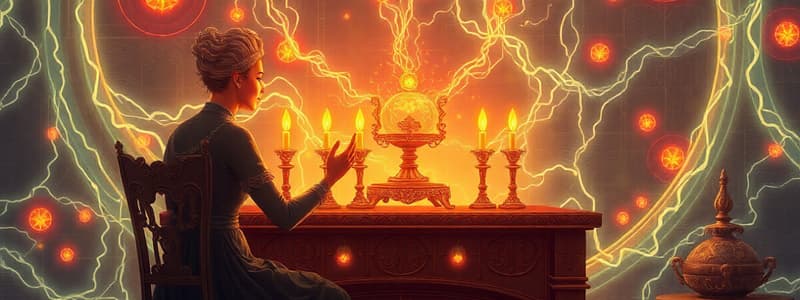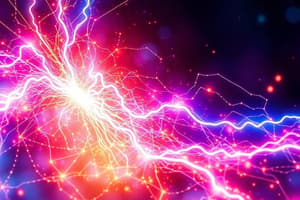Podcast
Questions and Answers
What property of insulators prevents the flow of charges through them?
What property of insulators prevents the flow of charges through them?
- Their high temperature
- Their ionization level
- Their magnetic field
- Their tightly packed electrons (correct)
Which of the following scenarios best illustrates a poor conductor of electricity?
Which of the following scenarios best illustrates a poor conductor of electricity?
- Sugar dissolved in water (correct)
- Salt water flowing through a wire
- Air during a lightning storm
- A copper wire connected to a battery
Why is distilled water considered a poor conductor of electricity?
Why is distilled water considered a poor conductor of electricity?
- It does not contain any ions (correct)
- It contains a high concentration of minerals
- It has a low boiling point
- It is not in liquid form
What is an electrolyte?
What is an electrolyte?
What happens during the process of electrolysis?
What happens during the process of electrolysis?
Which type of light bulb can detect the flow of small amounts of electric current?
Which type of light bulb can detect the flow of small amounts of electric current?
What is the main reason certain liquids do not heat the filament of a bulb?
What is the main reason certain liquids do not heat the filament of a bulb?
What are anions and cations?
What are anions and cations?
What is the primary effect of electric current observed in a light bulb?
What is the primary effect of electric current observed in a light bulb?
In the process of electroplating, which electrode acts as the anode?
In the process of electroplating, which electrode acts as the anode?
Which of the following is NOT a common application of the chemical effects of electric current?
Which of the following is NOT a common application of the chemical effects of electric current?
What type of electrolyte is necessary for depositing copper during electroplating?
What type of electrolyte is necessary for depositing copper during electroplating?
During the electrolysis of water, what are the products formed?
During the electrolysis of water, what are the products formed?
Which process uses electric current to extract pure metals from their ores?
Which process uses electric current to extract pure metals from their ores?
What is the role of the cathode in the electroplating process?
What is the role of the cathode in the electroplating process?
What is the purpose of galvanization?
What is the purpose of galvanization?
What happens to the copper ions during the electroplating of brass?
What happens to the copper ions during the electroplating of brass?
How does the strength of the current affect the electroplating process?
How does the strength of the current affect the electroplating process?
Flashcards
Good conductors of electricity
Good conductors of electricity
Materials that allow the flow of electric charges through them easily.
Insulators
Insulators
Materials that resist the flow of electric charges through them.
Electrolysis
Electrolysis
The process where components of a compound are split apart due to the passage of electric current through it.
Electrolyte
Electrolyte
Signup and view all the flashcards
Electrode
Electrode
Signup and view all the flashcards
Anion
Anion
Signup and view all the flashcards
Cation
Cation
Signup and view all the flashcards
Electroplating
Electroplating
Signup and view all the flashcards
Heating Effect of Electric Current
Heating Effect of Electric Current
Signup and view all the flashcards
Mechanical Effect of Electric Current
Mechanical Effect of Electric Current
Signup and view all the flashcards
Magnetic Effect of Electric Current
Magnetic Effect of Electric Current
Signup and view all the flashcards
Chemical Effect of Electric Current
Chemical Effect of Electric Current
Signup and view all the flashcards
Anode in Electroplating
Anode in Electroplating
Signup and view all the flashcards
Cathode in Electroplating
Cathode in Electroplating
Signup and view all the flashcards
Electrolysis for Metal Extraction
Electrolysis for Metal Extraction
Signup and view all the flashcards
Electrolysis for Metal Purification
Electrolysis for Metal Purification
Signup and view all the flashcards
Electrolysis for Decomposition of Compounds
Electrolysis for Decomposition of Compounds
Signup and view all the flashcards
Study Notes
Electrical Conductivity of Materials
- Insulators have tightly packed electrons, preventing charge flow.
- Conductors allow complete charge flow. All materials can conduct under specific conditions (e.g., air in thunderstorms).
- Liquids can be good or poor conductors.
- Dissolved salts and minerals in water are good conductors. Charged ions in the solution carry the current.
- Distilled water is a poor conductor. Sugar water, oil, and alcohol are also poor conductors as they do not form ions.
- LED bulbs are useful for testing conductivity as they light up with even small currents.
Electrolysis
- Electrolysis is the splitting of a compound's components using an electric current.
- An electrode conducts electricity into non-metals or poor conductors.
- An electrolyte is a solution that ionizes when electricity passes through it.
Electrolytes and Electroplating
- Electrolytes are used in electroplating.
- Electroplating deposits a layer of metal onto another.
- Selecting the correct electrodes and electrolyte is crucial.
- The anode is the metal to be plated out.
- The cathode is the object to receive the coating.
- The electrolyte solution includes the metal to be plated.
- Factors like current strength and electrolyte concentration affect plating speed.
- Selecting the correct electrodes and electrolyte is crucial.
Chemical Effects of Electric Current
- Heating Effect: Current heats components (e.g., light bulb filament).
- Mechanical Effect: Current generates mechanical energy (e.g., fans, motors).
- Magnetic Effect: Current produces a magnetic field.
- Chemical Effects:
- Metallic Deposits: Electroplating applies a metal layer to another.
- Electroplating is used in various industries for decorative and protective coatings (kitchenware, vehicles, jewelry, etc.)
- Examples: copper on brass, gold on base metals, tin on iron to prevent rust, chromium for shine and corrosion prevention, nickel for protection from human contact, zinc for galvanizing iron.
- Extracting Metals: Electrolysis extracts pure metals from ores.
- Examples include aluminium, magnesium, potassium, sodium, and calcium.
- Purifying Metals: Electrolysis separates pure metals from impurities.
- Impurities remain in the electrolyte. Examples include aluminium, zinc, and copper purification.
- Decomposition of Compounds: Electrolysis breaks down compounds into their components.
- Example: water decomposing into hydrogen and oxygen.
- Metallic Deposits: Electroplating applies a metal layer to another.
Studying That Suits You
Use AI to generate personalized quizzes and flashcards to suit your learning preferences.




